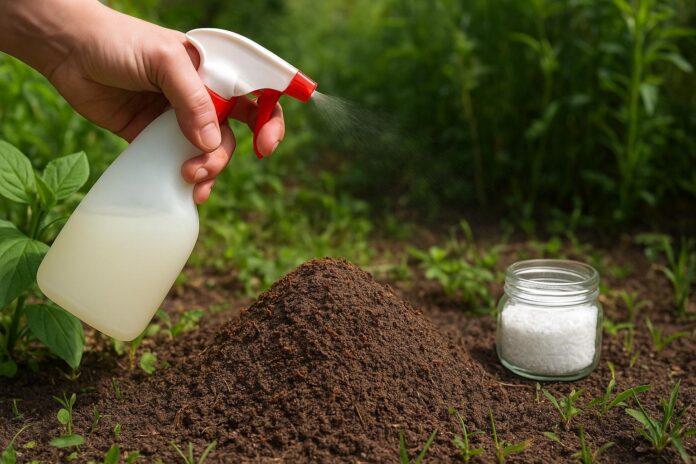Ants in the garden may seem harmless, but when colonies multiply, they can quickly become a nuisance. Besides being annoying, ants often attract other pests like aphids, which damage your plants by feeding on their sap. If you’ve noticed an increased number of ants around your garden, it’s time to explore both natural remedies and preventive strategies to control them safely.
Why do ants appear in the garden?
Ants are constantly searching for three main things:
- Food: Leftover crumbs, sugar, honey, or sweet plant secretions.
- Water: Moist areas, especially during summer heat.
- Shelter: Warm, humid spots in the soil, often near plant roots.
💡 While their presence can sometimes be beneficial—since ants help aerate the soil—large infestations can disturb the natural balance and harm plant health.
Natural methods to get rid of ants
Instead of resorting to harsh chemicals, try these eco-friendly solutions to eliminate ants while keeping your garden safe.
1. Vinegar spray

Vinegar is a simple and natural ant repellent. Mix equal parts water and vinegar in a spray bottle and apply it to areas where ants frequently appear. The strong smell drives them away instantly.
2. Cinnamon and cloves

Ants can’t stand the scent of cinnamon or cloves. Sprinkle the powdered spices near their nests or along garden paths to deter them naturally.
3. Baking soda and sugar mix

This trick combines attraction with elimination. Mix baking soda with powdered sugar—the sugar lures the ants, while the baking soda disrupts their digestive system, gradually reducing the colony.
4. Soapy water solution

A safe method for both plants and soil. Mix liquid soap with water and spray directly onto ants. The solution breaks down their protective outer layer, killing them effectively.
5. Coffee grounds

Don’t throw away your used coffee grounds! They act as a natural ant repellent. Scatter them around flowerbeds, potted plants, or near anthills to keep ants from returning.
Prevention tips to stop ants from coming back
Getting rid of ants is one step—but prevention is the key to long-term results.
- Keep your garden clean: Avoid leaving food scraps or waste outside.
- Water wisely: Too much moisture attracts ants. Stick to proper watering schedules.
- Control aphids: Since ants “farm” aphids for their sweet honeydew, reducing aphid populations will also reduce ants.
- Seal cracks and gaps: Check patios, tiles, and outdoor flooring for holes that could host ant colonies.
What to avoid when dealing with ants
Not all solutions are safe for your garden. Be cautious with:
- Chemical insecticides: They may harm plants, soil quality, pets, and even beneficial insects.
- Overuse of salt or powders: These can dry out the soil and damage plant health.
- Ignoring cleanliness: If food sources remain, ants will keep returning no matter what methods you try.
Frequently asked questions (FAQ)
Are ants dangerous to plants?
Not directly—but they encourage aphid populations, which damage plants.
How quickly do natural remedies work?
It may take a few days of consistent application depending on colony size.
Can I use these methods in my vegetable garden?
Yes—remedies like vinegar, coffee grounds, and soapy water are safe for edible plants.
Final thoughts
Controlling ants in the garden doesn’t always require chemicals. With simple, safe, and natural methods, you can protect your plants while maintaining a healthy ecosystem. Remember:
- Keep your garden clean and well-maintained.
- Use natural repellents like vinegar, coffee, and cinnamon.
- Focus on prevention to avoid recurring infestations.
By combining good garden hygiene with eco-friendly remedies, you’ll enjoy a thriving, ant-free outdoor space all season long. 🌿



